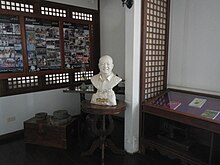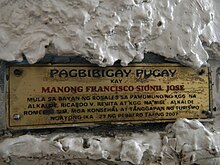F. Sionil José
F. Sionil José | |
|---|---|
Order of National Artists of the Philippines Pablo Neruda Centennial Award (2004) | |
| Spouse | Tessie Jovellanos Jose |
Francisco Sionil José (December 3, 1924 – January 6, 2022) was a Filipino writer who was one of the most widely read in the English language.[1][2] A National Artist of the Philippines for Literature, which was bestowed upon him in 2001, José's novels and short stories depict the social underpinnings of class struggles and colonialism in Filipino society.[3] His works—written in English—have been translated into 28 languages, including Korean, Indonesian, Czech, Russian, Latvian, Ukrainian and Dutch.[4][5] He was often considered the leading Filipino candidate for the Nobel Prize in Literature.[6][7]
Early life


José was born in
One of the greatest influences to José was his industrious mother who went out of her way to get him the books he loved to read, while making sure her family did not go hungry despite poverty and landlessness. José started writing in grade school, at the time he started reading. In the fifth grade, one of José's teachers opened the school
Writing career
José attended the
José Rizal's life and writings profoundly influenced José's work. The five volume Rosales Saga, in particular, employs and integrates themes and characters from Rizal's work.[8] Throughout his career, José's writings espouse social justice and change to better the lives of average Filipino families. He is one of the most critically acclaimed Filipino authors internationally, although much underrated in his own country because of his authentic Filipino English and his anti-elite views.[1][2][3]
"Authors like myself choose the city as a setting for their fiction because the city itself illustrates the progress or the sophistication that a particular country has achieved. Or, on the other hand, it might also reflect the kind of decay, both social and perhaps moral, that has come upon a particular people."
— F. Sionil José, BBC.com, 30 July 2003[1]
Sionil José also owned
In his regular column, Hindsight, in
Death
José died on the night of January 6, 2022, aged 97, at the Makati Medical Center, where he was scheduled for an angioplasty the next day.[10][11][12]
Awards
Five of José's works have won the Carlos Palanca Memorial Awards for Literature: his short stories The God Stealer in 1959, Waywaya in 1979, Arbol de Fuego (Firetree) in 1980, his novel Mass in 1981, and his essay A Scenario for Philippine Resistance in 1979.[13]
Since the 1980s, various award-giving bodies have feted José with awards for his outstanding works and for being an outstanding Filipino in the field of literature. His first award was the 1979 City of Manila Award for Literature which was presented to him by Manila Mayor Ramon Bagatsing.[citation needed] The following year, he was given the prestigious Ramon Magsaysay Award for Journalism, Literature and Creative Communication Arts.[citation needed] Among his other awards during that period include the Outstanding Fulbrighters Award for Literature (1988)[citation needed] and the Cultural Center of the Philippines Award (Gawad para sa Sining) for Literature (1989).[citation needed]
By the turn of the century, José continued to receive recognition from several award-giving bodies. These include the Cultural Center of the Philippines Centennial Award in 1999, the prestigious Chevalier dans l'Ordre des Arts et Lettres in 2000, and the Order of Sacred Treasure (Kun Santo Zuiho Sho) in 2001. In that same year, the Philippine government bestowed upon him the prestigious title of National Artist for Literature for his outstanding contributions to Philippine literature.[14] In 2004, José garnered the coveted Pablo Neruda Centennial Award in Chile.[15]
Works
Rosales Saga novels
A five-novel series that spans three centuries of Philippine history, translated into 22 languages[citation needed]:
- ISBN 971-8845-10-0
- ISBN 971-8845-00-3
- ISBN 971-8845-16-X
- ISBN 0-86861-572-2
- ISBN 971-8845-14-3
Original novels containing the Rosales Saga
- Source (Po-on) (1993) ISBN 0-375-75144-0
- Don Vicente (1980) ISBN 0-375-75243-9– Tree and My Brother, My Executioner combined in one book
- The Samsons ISBN 0-375-75244-7The Pretenders and Mass combined in one book
Other novels
- ISBN 978-971-536-105-7
- ISBN 978-971-8845-04-2
- ISBN 0-517-28446-4
- ISBN 971-8845-32-1
- ISBN 971-8845-12-7
- Vibora! (2007)
- Sherds (2008)
- Muse and Balikbayan: Two Plays (2008)
- Short Stories (with Introduction and Teaching Guide by Thelma B. Kintanar) (2008)
- The Feet of Juan Bacnang (2011)
Novellas
- ISBN 9780307830289
- ISBN 9711001136
Short story collections
- ISBN 971-8845-35-6
- Puppy Love and Thirteen Short Stories (March 15, 1998) ISBN 978-971-8845-26-4
- Olvidon and Other Stories (1988) ISBN 971-8845-18-6
- Platinum: Ten Filipino Stories (1983) ISBN 971-8845-22-4(now out of print, its stories are added to the new version of Olvidon and Other Stories)
- Waywaya: Eleven Filipino Short Stories (1980) ISBN 99922-884-0-X
- Asian PEN Anthology (as editor) (1966)
- Short Story International (SSI): Tales by the World's Great Contemporary Writers (Unabridged, Volume 13, Number 75) (co-author, 1989) ISBN 1-55573-042-6
Children's books
- The Molave and The Orchid (November 2004)
Verses
- Questions (1988)
Essays and non-fiction
- In Search of the Word (De La Salle University Press, March 15, 1998) ISBN 978-971-555-264-6
- We Filipinos: Our Moral Malaise, Our Heroic Heritage (1999)
- Soba, Senbei and Shibuya: A Memoir of Post-War Japan (2000) ISBN 978-971-8845-31-8
- Heroes in the Attic, Termites in the Sala: Why We are Poor (2005)
- This I Believe: Gleanings from a Life in Literature (2006)
- Literature and Liberation (co-author) (1988)
In translation
- Zajatec bludného kruhu (The Pretenders) (Czech language, Svoboda, 1981)
- Po-on (ISBN 978-971-555-267-7
- Anochecer (Littera) (ISBN 978-84-95354-95-2
In anthologies
- Tong (a short story from Brown River, White Ocean: An Anthology of Twentieth-Century Philippine Literature in English by Luis Francia, Rutgers University Press, August 1993) ISBN 978-0-8135-1999-9
In film documentaries
- Francisco Sionil José – A Filipino Odyssey by Art Makosinski (Documentary, in color, 28min, 16mm. Winner of the Golden Shortie for Best Documentary at the 1996 Victoria Film and Video Festival)[16]
Reviews
"...the foremost Filipino novelist in English... his novels deserve a much wider readership than the Philippines can offer. His major work, the Rosales saga, can be read as an allegory for the Filipino in search of an identity..."
— Ian Buruma, The New York Review of Books[17]
"Sionil José writes English prose with a passion that, at its best moments, transcends the immediate scene. (He) is a masterful short story writer..."
— Christine Chapman, International Herald Tribune, Paris[17]
"...America has no counterpart to José – no one who is simultaneously a prolific novelist, a social and political organizer, and a small scale entrepreneur...José's identity has equipped him to be fully sensitive to the nation's miseries without succumbing, like many of his characters to corruption or despair...
— James Fallows, The Atlantic Monthly[17]
"...The reader of his well crafted stories will learn more about the Philippines, its people and its concerns than from any journalistic account or from a holiday trip there. José's books takes us to the heart of the Filipino mind and soul, to the strengths and weaknesses of its men, women, and culture.
— Lynne Bundesen, Los Angeles Times[17]
See also
- Philippine literature in Spanish
- Philippine literature in English
- Literature of the Philippines
- Philippine English
- Thomasites
- Philinda Rand
- Stevan Javellana
References
- ^ a b c d e f g Jose, F. Sionil (July 30, 2003). "Sense of the City: Manila". BBC News. Retrieved June 14, 2007.
- ^ a b c d e f "Author Spotlight: F. Sionil Jose". Random House. Archived from the original on February 25, 2008. Retrieved June 14, 2007.
- ^ a b c d e f Macansantos, Priscilla S. (April 25, 2007). "A Hometown as Literature for F. Sionil José". Global Nation. Inquirer.net. Archived from the original on July 16, 2011. Retrieved June 14, 2007.
- ^ Garcia, Cathy Rose. (April 27, 2007). "Author F. Sionil Jose's Insight on Philippines". Arts & Living. The Korea Times. Archived from the original on May 20, 2011. Retrieved December 19, 2008.
- ^ Garcia, Cathy Rose. (April 27, 2007). "Author F. Sionil Jose's Insight on Philippines". BookAsia.org (Korean website). Retrieved December 19, 2008.
- ^ Leslie Nguyen-Okwu (October 11, 2015). "Will Francisco Sionil José Ever Win the Nobel Prize?". ozy.com. Archived from the original on June 30, 2022. Retrieved May 21, 2022.
- ^ Aldrin Calimlim (October 13, 2016). "Reading list: The Nobel Prize in Literature of the 2010s". CNN. Archived from the original on October 18, 2016. Retrieved May 21, 2022.
- ^ Scalice, Joseph (December 17, 2004). "Articulating Revolution: Rizal in F. Sionil José's Rosales Saga". Archived from the original on February 14, 2008. Retrieved December 19, 2006.
- ^ José, F. Sionil (September 11, 2011). "Why we are shallow". The Philippine Star. Retrieved October 11, 2014.
- ISSN 0362-4331. Retrieved January 8, 2022.
- ^ "National Artist F Sionil Jose dies at 97". Rappler. January 6, 2022. Retrieved January 6, 2022.
- ^ "Literary giant F. Sionil Jose dies at 97". The Manila Times. January 8, 2022. Retrieved January 8, 2022.
- ^ "Guest of Honor Introduction - NATIONAL ARTIST FOR LITERATURE – MR. F. SIONIL JOSE". Carlos Palanca Memorial Awards. 2011. Retrieved April 28, 2016.
- better source needed]
- ^ Sarao, Zacarian. "National Artist for Literature F. Sionil Jose dies at 97". Inquirer.net. Retrieved January 6, 2022.
- ^ Makosinski, Art (1996). "Francisco Sionil José – A Filipino Odyssey". ME.UVIC.ca. Archived from the original on June 11, 2007. Retrieved June 16, 2007.
- ^ a b c d Makosinski, Art. "About Francisco Sionil José". Engr.Uvic.ca. Archived from the original on June 9, 2007. Retrieved June 16, 2007.
Further reading
- The Writings of F. Sionil Jose, Archives, The New York Times. Retrieved on June 16, 2007
- The Works of Francisco Sionil Jose, The New York Public Library. Retrieved on June 16, 2007
- Books of F. Sionil Jose, Amazon.com. Retrieved on June 16, 2007
- Filipino English: Literature As We Think It (from F. Sionil Jose's Keynote Lecture at the Conference on "Literatures in Englishes" at the National University of Singapore), F. Sionil Jose: National Artist for Literature, Foremost Novelist, and Stanford.edu, March 19, 2006. Retrieved on June 16, 2007
- Jose, F. Sionil. "We Who Stayed Behind (Many fled the Philippines during the Marcos years, writes F. Sionil Jose. But what about those who remained?)", Asian Journey, Time Asia magazine (18–25 August 2003 issue), Time.com, 11 August 2007. Retrieved on June 21, 2007
- Allen Gaborro, A book review about Sins, a novel by F. Sionil Jose, Random House, 1996, Eclectica.org. Retrieved on April 22, 2008
- Frankie Sionil José: A Tribute by Edwin Thumboo (editor) (Times Academic Press, Singapore, January 2005) ISBN 978-981-210-425-0
- Conversations with F. Sionil José by Miguel A. Bernard (editor) (Vera-Reyes Publishing Inc., Philippines, 304 pages, 1991
- The Ilocos: A Philippine Discovery by James Fallows, The Atlantic Monthly magazine, Volume 267, No. 5, May 1991
- F. Sionil José and His Fiction by Alfredo T. Morales (Vera-Reyes Publishing Inc., Philippines, 129 pages)
- Die Rosales Saga von Francisco Sionil José. Postkoloniale Diskurse in der Romanfolge eines Philippinischen Autors by Hergen Albus (SEACOM Edition, Berlin, 2009)
- Post-colonial Discourses in Francisco Sionil José's Rosales Saga: Post-colonial Theory vs. Philippine Reality in the Works of a Philippine Autor by Hergen Albus (Südwestdeutscher Verlag für Hochschulschriften, 14. November 2012)
External links
- F. Sionil José: The Myth of a Filipino Writer Archived February 11, 2021, at the Wayback Machine
- Full Text: The God Stealer by F. Sionil Jose


